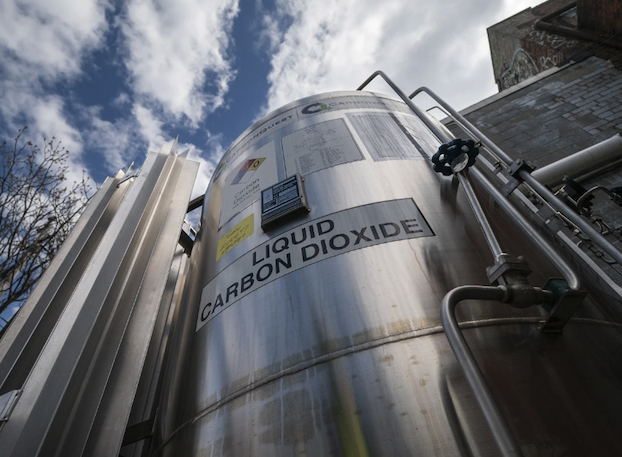Louisiana lawmakers reject all but one carbon capture bill
Published 12:48 pm Wednesday, April 30, 2025

- A liquid carbon dioxide containment unit stands outside the fabrication building of Glenwood Mason Supply Company in 2023, in the Brooklyn borough of New York. New York is forcing buildings to clean up, and several are experimenting with capturing carbon dioxide, cooling it into a liquid and mixing it into concrete where it turns into a mineral. (Associated Press)
By Nolan McKendry | The Center Square
Legislators rejected seven bills on Tuesday that would have greatly hindered the development of carbon capture and sequestration, a major blow to Louisiana constituents concerned about eminent domain and CO2 leaks.
Only one bill moved through the House Natural Resources Committee.
Senate Bill 73, from Sen. Mike Reese, R-Beauregard, passed without objection. The bill requires the commissioner of conservation to give significant weight to local government input when making decisions on carbon dioxide sequestration projects that involve public comments or hearings.
Marketed as a way to reduce carbon emissions, carbon capture and sequestration allows various industries to market their products as low carbon to international and domestic markets.
According to Louisiana Economic Development, there are currently $23 billion in carbon capture related investments in the state, with a projected 4,500 jobs.
The committee met for more than 13 hours.
Opposition to the restrictive bills included industry and parish leaders from all over Louisiana, such as Anna Johnson, president of the West Baton Rouge Chamber of Commerce, Ray Gregson, executive director of the River Regions Chamber of Commerce, Michael Hecht, president & CEO of Greater New Orleans and representatives from the Louisiana Association of Business and Industry, Entergy, the Louisiana Oil and Gas Association and Landowners Association.
The technology is a potential “game changing opportunity,” according to the River Region Chamber of Commerce.
The regional chamber recently announced strong support for carbon capture and sequestration, calling the technology essential to securing billions in industrial investment, creating high-quality jobs, and maintaining Louisiana’s competitive edge in global energy markets.
Citing the 2024-25 Louisiana Economic Forecast by economist Dr. Loren Scott, the chamber emphasized that more than $150 billion in industrial projects across three metro areas are tied to the successful implementation of CCS and access to renewable energy.
Beyond economics, the chamber argued CCS is a proven, safe technology that has operated in the U.S. for decades, with more than 200 million tons of CO₂ safely stored underground since the 1970s. It said supporting CCS can both reduce emissions and modernize the state’s energy infrastructure without relying on restrictive energy policies or mandates.
The chamber also emphasized job creation, noting that the state’s oil and gas sector has lost more than 20,000 jobs since 2015. CCS, they argue, could absorb much of that displaced workforce, especially in areas like welding, operations, and maintenance.
There are currently over 20 bills filed which would’ve greatly limited the technology. Some of them function to give landowners and local communities more power in refusing carbon capture, others impose heavy regulations on the technology itself.
Much of the testimony from witnesses expressed concerns on the use of eminent domain, which several bills aimed to address.
“You have to give it back to people and let them have the right to vote,” said Renne Savant, representing the Louisiana CO2 Alliance.
Savant took issue with former Sen. Sharon Hewitt’s 2020 law which extended eminent domain authority to include pipelines transporting CO2 to storage facilities.
“She said ‘we’re going to take it out of the air, and put it in existing pipelines and sequester it. Never did she mention the hundreds of miles of new pipelines’,” Savant said. “Never did she mention the millions of toxic CO2 byproducts that will be put underground, never mentioned anything about property rights.”
Savant was one of many whose testimony was less than friendly to the burgeoning technology.
Chris Alexander, a Baton Rouge attorney, called CCS “a complete racket that is being paid for with our money and being imposed on citizens throughout this state, whether or not they want it or not, and that, quite frankly, is a disgrace”
Roland Hollins, an Allen Parish Police Jury member, said that parishes are “being forced to take this poison that we don’t want.”
“I’m not saying I’m for or against [CCS],” Hollins said in an interview with The Center Square. “But our people ought to be the ones who make that decision. Not Baton Rouge, not industry. Right now, the industry has a pistol in their pocket with eminent domain.”
Rep. Shane Mack, R-Livingston, introduced a bill to strengthen safety and environmental protections for carbon dioxide storage and pipeline projects. Schamerhorn introduced a bill that would allow victims of CO2 leaks to claim money for damages.
Opponents argued that Schamerhorn’s bill would drive CO2 investment out of Louisiana by creating legal risks companies wouldn’t accept and that Mack’s bill was superfluous and because the bill imposed broad, open-ended financial liabilities and regulatory obligations on carbon storage operators.
“The benefits do not outweigh the costs,” Schamerhorn said.





